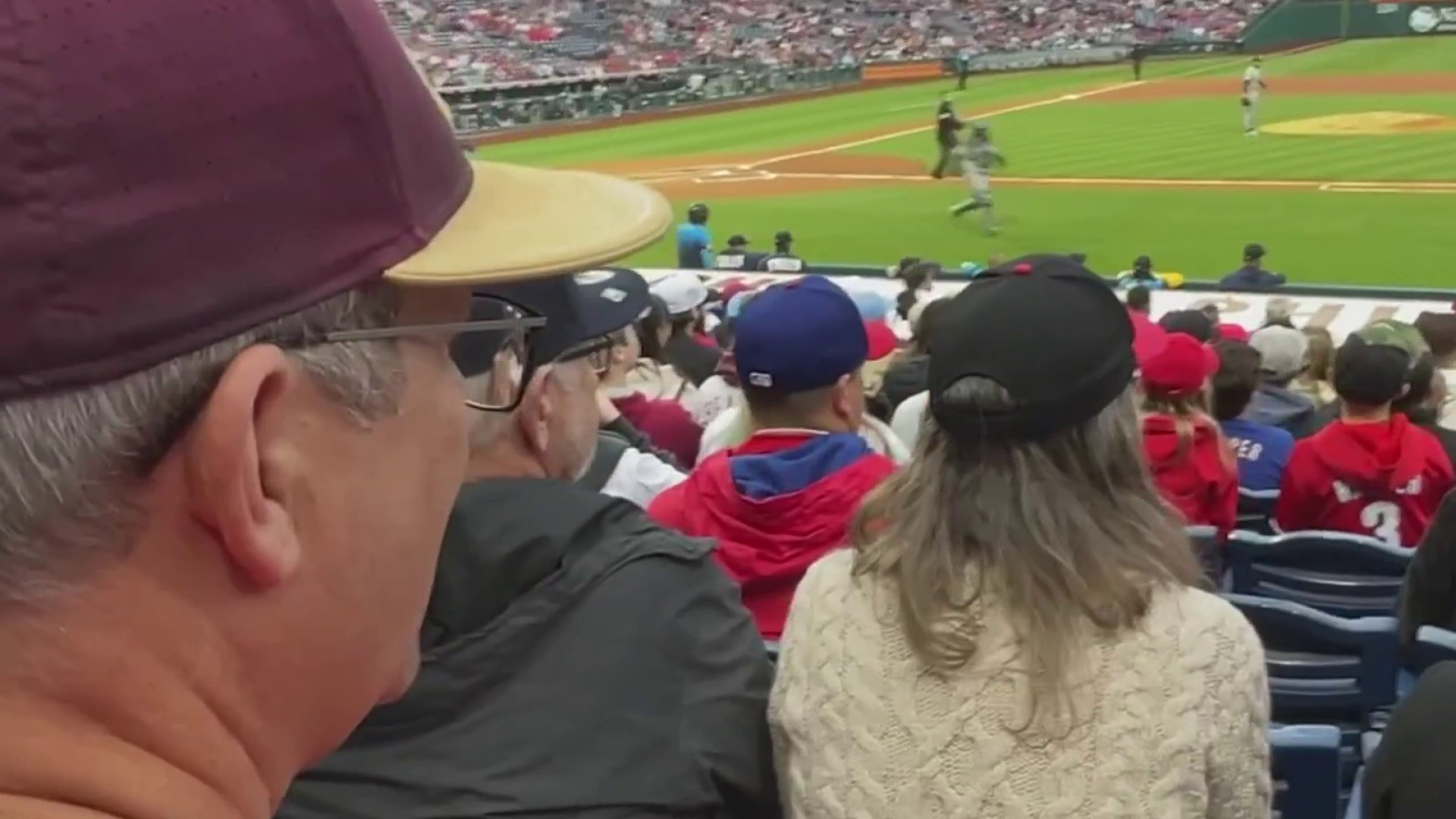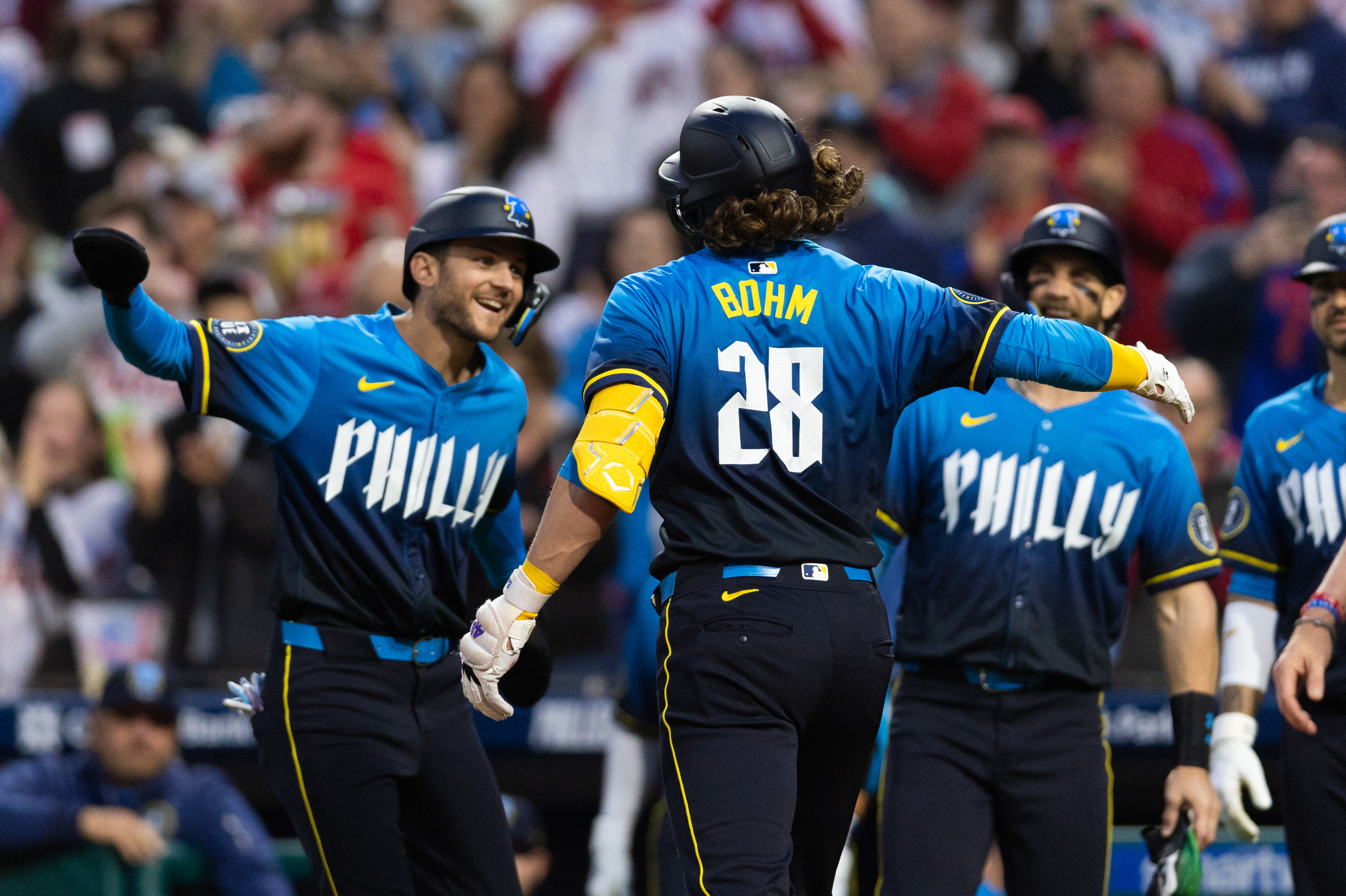ALLENTOWN, Pa. - Plastered on a wall outside the press box in Coca-Cola Park is a sign - "Pigs to the Bigs" - surrounded by dozens of stars.
Each has upon it the name of a player who has made the leap from the Triple A Lehigh Valley IronPigs to the parent Phillies since Lehigh Valley began operations in 2008 - everyone from outfielder Chris Snelling (April 30, 2008) to pitcher Nick Pivetta (April 29, 2017), the latter of whom has since returned to the IronPigs.
It is a study in the star-crossed, of guys who bounced up and down (Pete Orr, July 8, 2011), guys who flamed out (Domonic Brown, July 28, 2010), guys whose fate is yet to be determined (Maikel Franco, Sept. 3, 2014).
The point being that the path to major-league stardom seldom follows a straight line.
That has been demonstrated once again by the Phillies' top prospect, shortstop J.P. Crawford, who spent weeks in bounce-back mode earlier this season.
And now finds himself there again.
Philadelphia Phillies
Complete coverage of the Fightin' Phils and their MLB rivals from NBC Sports Philadelphia.
His 0-for-4 night in Thursday's 8-4 loss to Indianapolis left him hitless in his last 16 at-bats, his slash line for the season at .175/.291/.221.
Recall that Crawford, the 16th overall pick in the 2013 draft, had exactly four hits in 48 at-bats over his first 14 games of the season, an average of .083.
Never before had the 22-year-old experienced anything like it, and he took a methodical approach to remedying the problem. He did some video work. He tinkered with his stance. He consulted with hitting coach Sal Rende and roving minor-league hitting instructor Andy Tracy. And slowly but surely, he began coming around.
The thinking at that point was that his slump might serve as a valuable lesson, a blessing in disguise.
As Crawford put it hours before Thursday's first pitch, "I'd rather struggle here than if I ever make it to the big leagues, God willing. I'd much rather have it [happen] down here than up there."
Though it will happen there, too. Baseball, everyone always says, is a game of failure. It's just a matter of how each player deals with it, works through it, minimizes it.
Lehigh Valley manager Dusty Wathan has said repeatedly that he was impressed by Crawford's approach to his scuffling start, that he thought the youngster treated it as "a growing opportunity" that can only help him down the line.
It was all Wathan could have hoped for, for Crawford or anybody else.
"I think it's a good thing to be able to have some experience to look back on, later on," he said. "Now, when they're going through it they probably don't think of it that way, but those of us who have been around baseball and been in situations like that personally, too, know that it's going to get better."
Wathan, seated at his office desk in a T-shirt and shorts before Thursday's game, has been around the block. He previously managed Crawford at Double A Reading, and believes those 14 games in April represent a blip.
"We know that J.P.'s a great player," Wathan said. "I think [such struggles] can actually end up being a good thing for these guys."
If Crawford, a native Californian, had few previous failures to draw upon - "He hasn't really had any," Wathan said - he at least had a ready roster of big-time athletes in his family with whom he could commiserate. His dad, Larry, was a CFL defensive back from 1981-89. His cousin, Carl, was a major-league outfielder for 15 years, ending last season. His older sister, Eliza, played softball at Cal State-Fullerton.
Certainly it appears they have kept him grounded, because he is singularly unimpressed by his draft status or ranking with various scouting services.
"I [couldn't] care less about that," he said. "All that doesn't really matter. Once you get on the field, everyone's the same. Everyone's the same player."
Though he was somewhat less than that early on. He was admittedly frustrated, but far from defeated.
"You've got to stay on the positive [side] on everything," he said. "You can't get too down on yourself, or else you're just going to do worse."
Had it been a major-league situation instead of a player-development situation, it is entirely possible that Wathan would have held him out of the lineup a day or two, just to let him clear his head.
"Or maybe not, because he contributes every night, somehow," the manager said.
And as Crawford said, "You're not going to get better sitting. You've got to go out there and play."
He admitted earlier this month that while he had once been reluctant about video study, he found great benefit in it when he was looking for answers in late April.
He decided to raise his hands while at the plate, and the hits began to come. He batted at a .253 clip over 24 games, including a six-game hitting streak, bringing his average to a season-best .196 on May 20.
Now it's back to the drawing board. It is, after all, a game of failure. It's just a matter of dealing with it, working through it, minimizing it.
He has become well-acquainted with the concept.



